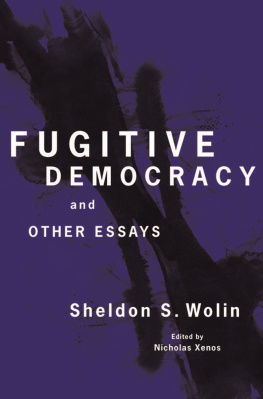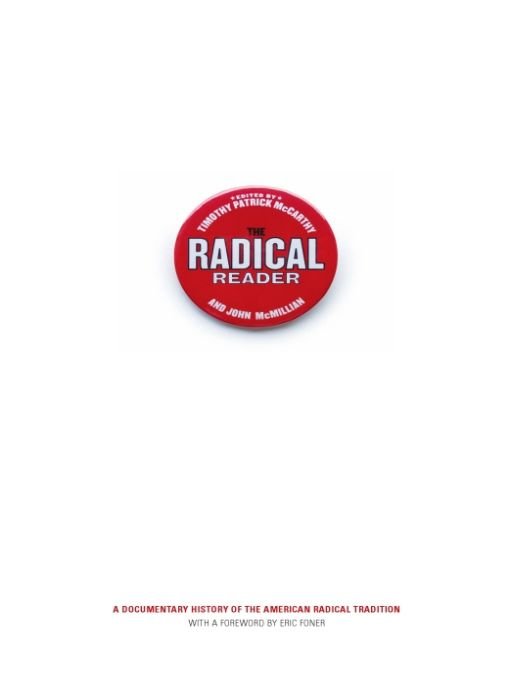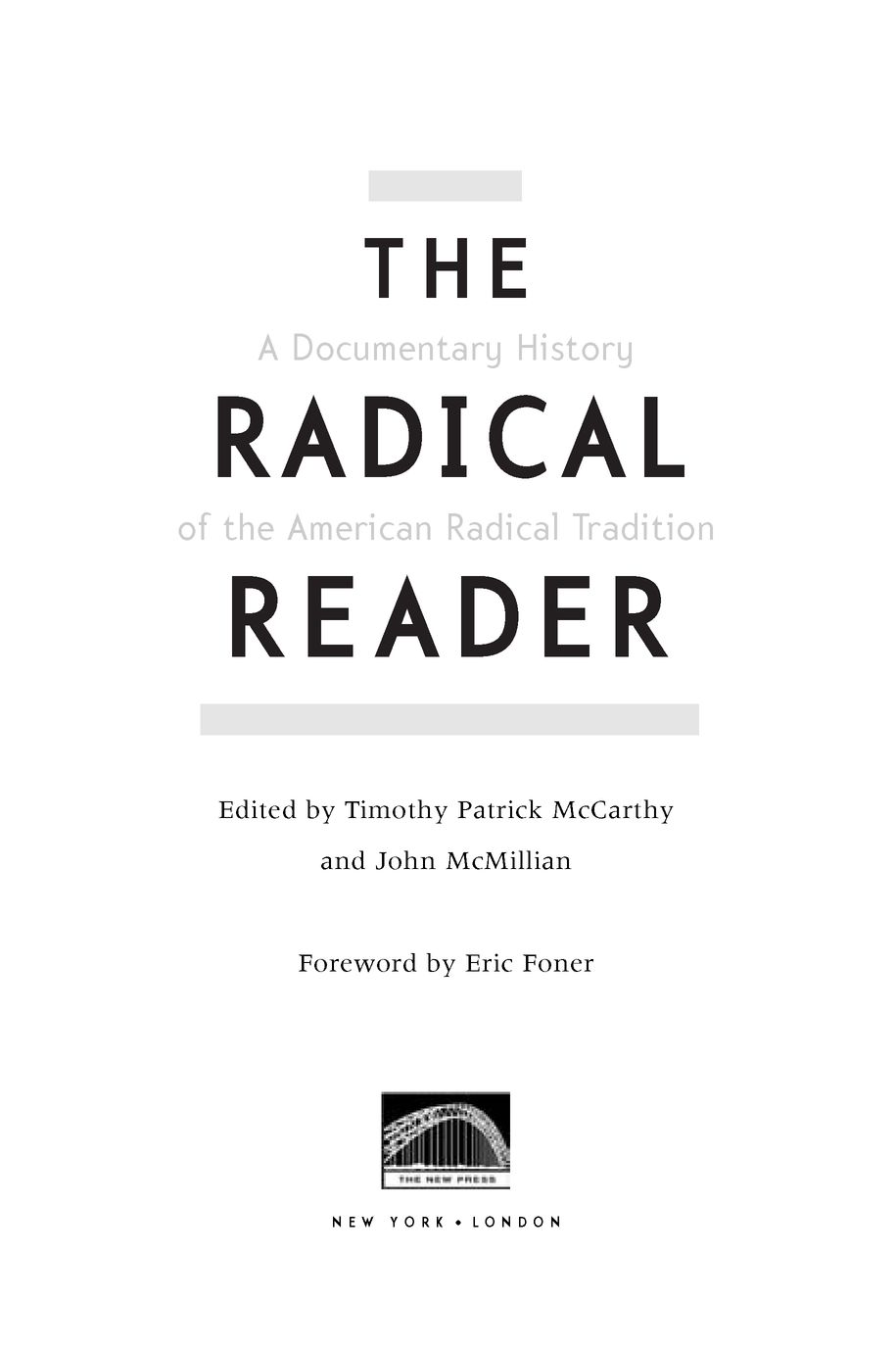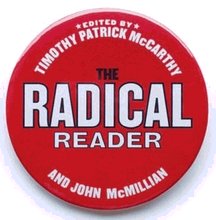Table of Contents
A DOCUMENTARY HISTORY OF THE AMERICAN RADICAL TRADITION
WITH A FOREWORD BY ERIC FONER
For our students
Foreword
With The Radical Reader, Timothy McCarthy and John McMillian, two energetic and insightful young scholars, have made a major contribution to our understanding of contemporary America and its history. Although numerous books have gathered together the writings of one or another strand of American radicalismfeminists, abolitionists, Populists, and the likeor particular eras of activism from the Revolution to the 1960s, no volume has previously been published that covers our entire national history and the full range of radical movements. Taken together, these documents offer vivid, eloquent testimony to the persistence and significance of the American radical tradition.
Throughout American history, radical movements have challenged Americans to live up to their professed ideals and have developed penetrating critiques of social and economic inequality. As the documents that follow make clear, they have done so in pursuit of different goals, and using a variety of tactics. Some radical movements accept the societys prevailing emphasis on the ideal of the free individual and seek to eliminate obstacles to its fulfilment, or extend it to excluded groups. Much of nineteenth-century labor radicalism fits this pattern, as do many many expressions of feminism and black radicalism. Other movements, based on a collectivist outlook, reject individualist values and see private property as an obstacle to genuine freedom. Various socialist and communitarian movements exemplify this type. Some movements take as their task uplifting the condition of a single group of Americans; others envision a sweeping transformation of the entire social order. Occasionally, radicals have resorted to violence, but most radical movements have reflected the democratic ethos of American lifethey have been open rather than secretive and have relied on education, example, or moral suasion, rather than coercion, to achieve their goals. Radicals have been on the receiving end of violence far more often than initiating it.
As the following documents reveal, although often castigated as foreign-inspired enemies of American institutions, radicals have always sprung from American culture and appealed to some of its deepest valuesfacts that help to explain radicalisms survival even in the face of tenacious opposition. From nineteenth-century radicals who insisted that the inalienable rights enshrined in the the Declaration of Independence were being undermined by slavery, gender discrimination, or the Industrial Revolution, to New Leftists who sought ways to restore participatory democracy to a society dominated by a military-industrial complex, radicals have adapted the language of American society to their own ends. In so doing, they have not only extended the benefits of American liberty to previously excluded groups, but have given American values new meanings.
Indeed, many ideas widely taken for granted and assumed to be timeless features of American culture originated with radical movements. The idea of freedom as a universal entitlement arose not from the founding fathers, who spoke of inalienable rights but made their peace with slavery, but from abolitionists, black and white, who invented the idea of equal citizenship irrespective of race. The modern idea of privacythe extension of individual rights into the most intimate areas of personal lifearose from the efforts of generations of feminists to secure for women control over their own persons. Our modern understanding of free expression stems not simply from the Bill of Rights, but from the struggles of the labor, birth control, and civil rights movements throughout the twentieth century to overturn laws and governmental practices that restricted the dissemination of ideas deemed radical, obscene, or socially dangerous. In many other ways, radical movements have made American society a better place.
The Radical Reader appears as new forms of radicalism are making their appearance in the United States and, indeed, across the globe. The collapse of communist governments, first in Eastern Europe and then the Soviet Union, produced a profound challenge to assumptions widely shared among radicals in the West. Radicals were forced to rethink the idea that history is moving in a predetermined direction in which the inequities of capitalism would be superseded by a more cooperative organization of politics and society. Many conventional ways of analyzing politics and power today seem obsolete. Socialism no longer seems viable as a goal of radicalism, nor does the industrial working class appear to be the leading agent of social change. But the end of the Cold War has also created opportunities for new kinds of radical thought and action. The Radical Reader ends with an epilogue sampling some of todays expressions of radicalism, including recent efforts to revitalize the labor and antiwar movements, rethink the struggle for black liberation, reinvigorate student activism, and challenge the consequences of unregulated economic globalization.
By definition, radicals are a minority. They often feel marginalizedrarely so much as today, when the government and media persistently tell Americans that there can be no vision of the world except for globalized corporate enterprise. But as The Radical Reader powerfully demonstrates, every generation of Americans since the Revolution has witnessed the emergence of some kind of radical critique. The twenty-first century is likely to be no different. The history of radicalism gathered in this volume offers confirmation of Max Webers rebuke to those who counsel the unthinking acceptance of prevailing norms and institutions, or who believe critics should call only for incremental change: What is possible would never have been achieved if, in this world, people had not repeatedly reached for the impossible.
Eric Foner
Columbia University
Acknowledgments
First, wed like to thank each other for a rare professional and personal friendship. This has been quite a ride!
One of the great joys of collaborative work is the chance, once its done, to offer thanks for support along the way. We are extremely grateful to the friends and colleagues who intervened on our behalf when this book was just an idea: Nancy Chauvin, Eric Foner, James Green, Maurice Isserman, Harvey Kaye, Jesse Lemisch, Mark Naison, Harvard Sitkoff, and Cornel West. Indeed, we have been blessed over the years with unconditional support from mentors who have inspired in us a desire to change the world through teaching, scholarship, and social action. Herbert Aptheker and Howard Zinn are those rare historians who have both made and written history; we are humbled by their example and grateful for their wisdom and friendship (we were deeply saddened to learn of Apthekers passing as this book was going into production). Cornel West has showered us with enthusiasm ever since we first met him, and his support, too, has been indispensable. Other colleagues at Harvardin the Committee on Degrees in History and Literature, in the Department of Afro-American Studies, and at Quincy Housewere very good to us while we were working on this book. Likewise, Brian Palmer, Harry Reed, Robert Hanning, Jesse Lemisch, Carolyn Rathjen, John Summers, Liam Day, Drew Willson, Sue Watts, Elizabeth Studley Nathans, Jeremy Varon, Jonathan Fortescue, Mike Ryan, and John Stauffer have also been wonderful friends to us over the years, and we appreciate their steady presence in our lives.









